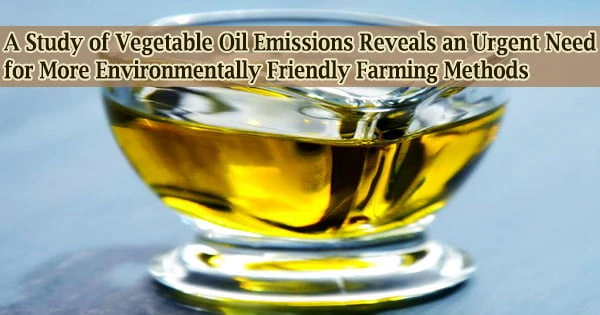A new global study has revealed the extent of greenhouse gas (GHG) emissions caused by vegetable oil production, highlighting the need for more sustainable growing solutions.
GHG emissions from practically all feasible systems now utilized to generate palm, soybean, rapeseed, and sunflower oil around the world were examined for the first time by scientists from the University of Nottingham’s Future Food Beacon.
The research was a meta-analysis that included all relevant studies published between 2000 and 2020 on the environmental impact of oil extraction. The findings were published in the journal Science of the Total Environment today.
This new study represents nearly 6,000 producers in 38 nations, accounting for more than 71% of global vegetable oil production. GHG emissions were 3.81 kg CO2e per kilogram of refined oil across all oil crop systems. Crop-specific median CO2e emissions per kilogram of refined oil ranged from 2.49 kg CO2e for rapeseed oil to 4.25 kg CO2e for soybean oil.
Despite receiving more unfavorable attention, median emissions from soybean oil were greater than those from palm oil. However, median rapeseed and sunflower oil systems produced fewer emissions than palm and soybean oil, indicating that they are more environmentally friendly options.
When a forest is cleared to make way for agriculture, the carbon stored in the trees and flora is released as CO2. A significant amount of carbon contained in the soil is frequently released.
The strength of having lots of different production systems included in this study is that we can identify the most sustainable systems for each crop type, and push for these to be adopted more widely. The results, particularly around land use, show that we should target production on low carbon storage potential land, although we also need to consider other sustainability indicators such as biodiversity. Most previous studies only considered recent land-use change, but in this study, we considered the impacts of continuing to grow crops on an area of land as well, instead of setting it aside for the regeneration of forests.
Dr. Thomas Alcock
The researchers studied the impact of this form of deforestation on agricultural sustainability. They also took into account the carbon costs of agricultural land occupation, even when deforestation occurred more than a century ago (as is likely the case for most of Europe).
This is because, even if no land-use change carbon is released today as a result of using the land for agriculture, the chance to store carbon, such as through re-planting trees, is lost. The researchers discovered that land use contributed significantly to GHG emissions, accounting for around half of all emissions.
Dr. Thomas Alcock, Future Food Beacon research fellow, and Postdoctoral Researcher at the Technical University of Munich led the research. He says: “The strength of having lots of different production systems included in this study is that we can identify the most sustainable systems for each crop type, and push for these to be adopted more widely.”
“The results, particularly around land use, show that we should target production on low carbon storage potential land, although we also need to consider other sustainability indicators such as biodiversity. Most previous studies only considered recent land use change, but in this study we considered the impacts of continuing to grow crops on an area of land as well, instead of setting it aside for regeneration of forests.”
The study emphasizes the need for and potential for improving sustainability within present production systems, such as boosting yields while reducing the use of high-carbon inputs, and in the case of palm oil, more widespread deployment of methane capture devices in processing stages.
Dr. Alcock explains: “This means reducing application of synthetic nitrogen to crops as much as possible. On-farm, this is generally the biggest source of GHG emissions. This is tricky, as crops need a lot of nitrogen to be productive, but there are ways to reduce this, such as through choosing crop cultivars that are more nitrogen-use efficient, and by including leguminous plants in the crop rotations, as these provide nitrogen to the soil more naturally.”





